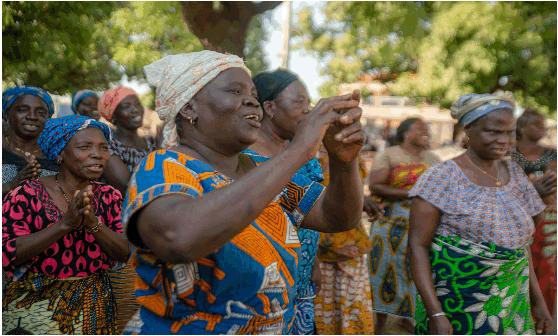Breaking the Cycle of Crisis: Women Leading Peace building and Conflict Resolution in the Gulf of Guinea
Source: United Nations
A group of women dressed in vibrant traditional attire gather outdoors, singing and clapping with joy. Their celebration goes beyond music—it symbolizes resilience, hope, and leadership. In the Gulf of Guinea, where communities face growing threats from violent extremism and transnational crime, women are emerging as key actors in breaking cycles of violence and driving peace and prosperity.
A Turning Point for Gender-Inclusive Peacebuilding
As the world marks 25 years of the Women, Peace, and Security (WPS) agenda—anchored in United Nations Security Council Resolution 1325—and the 30th anniversary of the Beijing Declaration and Platform for Action, the call to invest in women’s leadership is louder than ever. These milestones underscore the need for systemic change, where gender equality is integral to peace, sustainable development, and climate resilience.
More than 600 million women and girls live in areas affected by armed conflict. Conflict-related sexual violence increased by 50% in 2024 alone. Despite the disproportionate impact, women continue to be sidelined in peace and security decision-making processes. Yet studies show that peace agreements are significantly more durable and effective when women participate in negotiations and post-conflict reconstruction.
Women Preventing Violent Extremism Across the Region
In Benin, Burkina Faso, Côte d’Ivoire, Ghana, and Togo, women are challenging the narrative that they are only passive victims of violence. They are asserting their place as leaders in countering extremism and transforming their communities from the ground up.
Peripheral and border areas, often marginalized and underserved, are particularly vulnerable to extremist narratives. Addressing this vulnerability requires more than security interventions—it demands community-based, gender-sensitive strategies that tap into the potential of women as peacebuilders.
In Burkina Faso, a young woman who joined a UNDP-supported weaving program shared:
“Thanks to this practical training, I now understand the full process—from dyeing yarn to weaving. This marks a new beginning for me, and what I have learned will help me grow my business. The equipment we are set to receive will be invaluable.”
Programs like this not only foster entrepreneurship but also serve as a bulwark against extremist recruitment by offering alternative livelihoods and restoring hope.
Economic Empowerment as a Tool for Peace
In Côte d’Ivoire’s Ferkessédougou and Bouna regions, women are leading economic transformation through revitalized shea and cassava value chains. With support for training and infrastructure, local cooperatives—comprised mostly of women—have dramatically increased productivity and access to markets.
“Previously, we worked manually and could barely produce one ton of shea butter in two weeks. Now, with these new machines, we can produce up to five tons per month! The quality has improved, and this has restored our hope and dignity,” said a member of a local women’s association.
These initiatives not only boost economic resilience but also reduce the influence of extremist narratives that often exploit economic insecurity and marginalization.
Mentorship and Media for Social Cohesion
In Togo, over 100 women entrepreneurs and youth have benefited from business development support and agricultural inputs—creating stronger economic foundations and reducing susceptibility to extremist ideologies. These efforts are paired with mentorship programs and community dialogues to counter hate speech and foster unity.
Ghana has integrated more than 2,000 women into peace dialogues that bridge local communities and security institutions. These platforms ensure women’s perspectives are heard and integrated into peace and policy frameworks.
Meanwhile, women journalists in Togo have been trained to identify and counter misinformation, promoting narratives of peace and tolerance across media channels. In Benin, a participant from a recent workshop in Natitingou shared:
“We learned about the different types of propaganda and how to counter them. We also harmonized our strategies to target the same issues in our communities. This collective learning has strengthened our resolve.”
A Gender-Sensitive Pathway to Lasting Peace
The stories emerging from the Gulf of Guinea are testament to the resilience, creativity, and leadership of women on the frontlines of conflict prevention and peacebuilding. These efforts reflect a broader truth: investing in women creates ripple effects that uplift entire communities.
For long-term peace to take root, gender-sensitive policies and preventive mechanisms must be prioritized. This includes ensuring women and girls have access to resources, decision-making platforms, and leadership opportunities.
By intentionally involving women in peace processes and economic development, societies gain a powerful tool against violent extremism and instability—and move closer to a future grounded in dignity, resilience, and sustainable peace.








